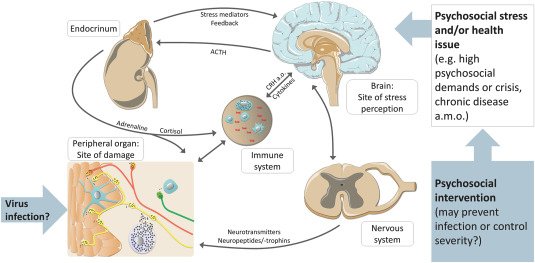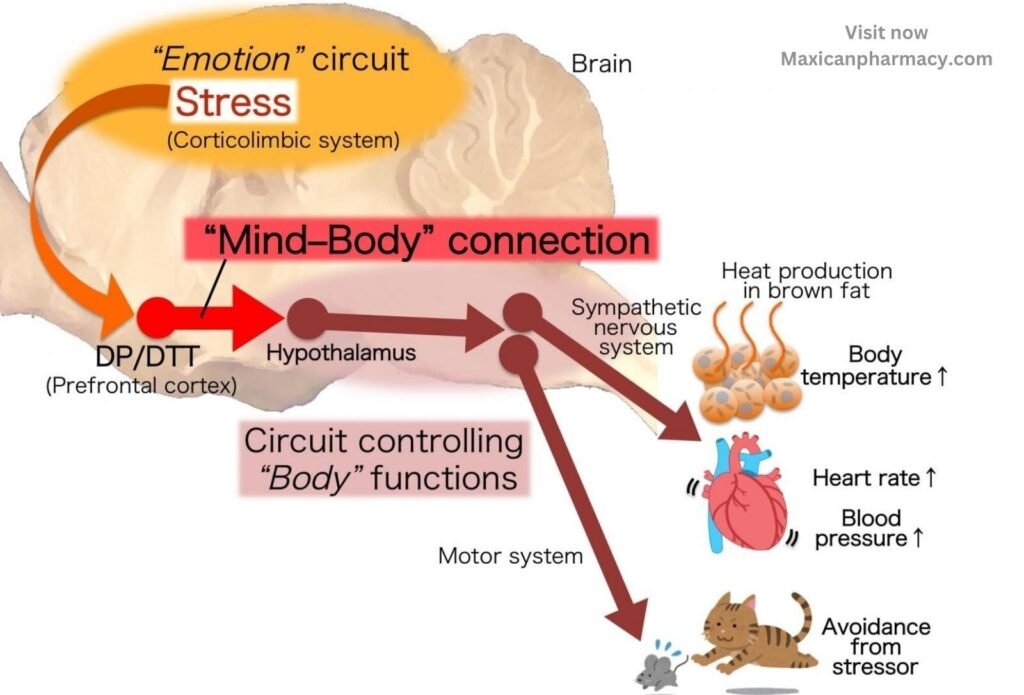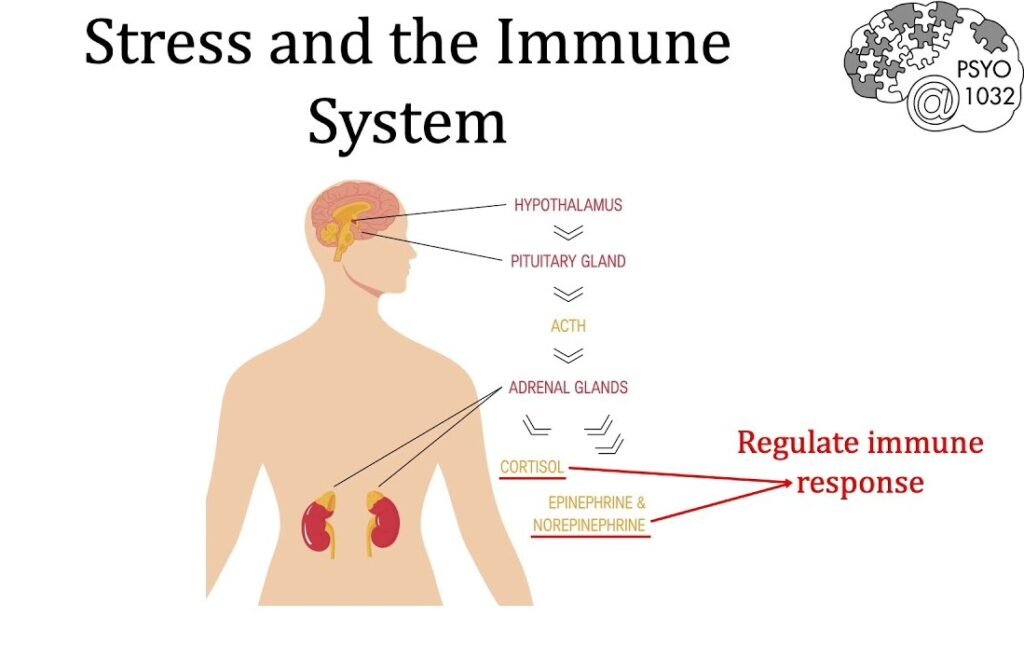Stress is a natural component of modern living, affecting people of all ages and walks of life. While stress is generally regarded as a psychological or emotional burden, it can also have serious physical consequences, particularly for the immune system. Chronic stress, in particular, can deplete the body’s natural defenses, making it more susceptible to infections, illnesses, and even chronic diseases. In this article, we’ll look at the complex relationship between stress and the immune system, including how stress affects immunity and what you can do to reduce its effects.
The Immune System: A Brief Overview
The immune system is the body’s principal defense mechanism against diseases like bacteria, viruses, and other dangerous intruders. It is made up of a complex network of cells, tissues, and organs, such as white blood cells, lymph nodes, and the spleen, that all work together to detect and remove possible threats.
The immunological response has two major components:
Innate Immunity: The first line of defense, which is non-specific and responds promptly to invaders.
Adaptive Immunity: A highly specialized response that takes longer to activate but is more effective against specific infections.
To function optimally, the immune system must respond in a regulated and coordinated manner. However, stress can upset this equilibrium, resulting in weakened immunity.
How Stress Affects The Immune System

Stress causes a sequence of physiological changes in the body, controlled by the hypothalamic-pituitary-adrenal (HPA) axis, including the release of stress hormones such as cortisol and adrenaline. While these modifications are intended to assist the body in dealing with acute dangers, persistent stress can cause a state of sustained activation that harms the immune system. Here’s how.
Elevated cortisol levels
Cortisol, the principal stress hormone, suppresses the immune system. While short-term cortisol release can assist reduce inflammation, persistent increase can suppress the generation of lymphocytes (white blood cells), making it more difficult for the body to fight infections.
Reduced White Blood Cell Activity
Chronic stress reduces the efficacy of white blood cells, such as natural killer (NK) cells, which are essential for fighting viruses and cancer cells. This lowering can make the body more susceptible to disease.
Increased inflammation.
Stress can cause an overproduction of pro-inflammatory cytokines, which are signaling molecules that control the immune response. Persistent inflammation is linked to a variety of health concerns, including autoimmune illnesses, cardiovascular disease, and diabetes.
Impaired communication between immune cells.
Stress affects communication networks between different immune system components, resulting in a less coordinated response to threats.
Delayed wound healing.
Stress has been found in studies to impede the body’s ability to repair wounds, emphasizing the importance of immunological function.
Chronic Stress and Health Risks
Stress has an impact on the immune system that extends beyond the occasional cold or virus. Chronic stress can lead to more significant health issues, such as:
Increased Infection Risk:
Chronic stress impairs the body’s ability to fight pathogens, increasing the frequency of illnesses such as colds, the flu, and other infections.
Autoimmune Diseases:
Chronic inflammation and immune system dysregulation can raise the risk of autoimmune disorders, in which the immune system erroneously targets its own tissues.
Cancer development:
Stress has been linked to accelerated cancer development because it suppresses NK cells and other immune responses.
Chronic inflammation generated by stress contributes to the development of atherosclerosis and other heart-related conditions.
The Mind-Body Connection

The link between stress and the immune system emphasizes the significance of the mind-body connection. Psychological variables such as stress, anxiety, and depression are inextricably linked with physical health. Recognizing this relationship is critical for maintaining general well-being.
Strategies to Reduce Stress and Boost Immunity
Fortunately, there are various evidence-based techniques to manage stress and promote a healthy immune system:
Regular exercise.
Physical activity reduces stress by reducing cortisol levels and releasing endorphins, which are the body’s natural mood lifters. Exercise also improves immune function by increasing circulation and the activity of white blood cells.
Adequate sleep.
Sleep is critical for immunological health because it allows the body to mend and rejuvenate. Aim for 7-9 hours of quality sleep per night and follow a consistent sleep schedule.
Balanced Diet
A nutrient-dense diet boosts the immune system by supplying necessary vitamins and minerals. To promote gut health, eat antioxidant-rich foods like fruits, vegetables, nuts, and seeds, as well as probiotics.
Mindfulness & Meditation
Mindfulness activities, such as meditation, yoga, and deep breathing exercises, can help reduce stress and boost immune function. These treatments stimulate the parasympathetic nervous system, resulting in calm and reduced inflammation.
Social Support
Strong social relationships can act as a stress reliever and immune system booster. Spending time with loved ones, joining support groups, or participating in community activities can all help you feel more connected.
Time Management
Poor time management can lead to stress. Prioritize chores, create realistic goals, and assign responsibilities to alleviate feelings of overwhelm.
Professional Help
If stress becomes unmanageable, consult a mental health professional. Therapy, counseling, and stress management programs can all help you cope better.
The Importance of Positive Lifestyle Choices
In addition to actively reducing stress, maintaining a healthy lifestyle can give a solid foundation for immunological health:
Hydration:
Staying hydrated benefits all physical systems, especially the immune system.
Limiting alcohol and tobacco use:
Both substances can weaken the immune system and increase stress.
Laughter and Joy:
Engaging in things that make you happy can reduce stress hormones and improve immunity.
Conclusion
Stress is an inescapable part of life, but its impact on the immune system emphasizes the significance of managing it properly. By recognizing the complex relationship between stress and immunity, we can take proactive measures to safeguard our health. Small modifications, like as mindfulness practices, regular exercise, and eating a well-balanced diet, can help to reduce stress and boost the body’s natural defenses significantly. Remember that your mind and body operate together, and taking care of both is vital for general health.

